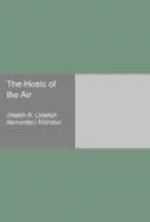There were many tracks of automobiles in the light snow and hail that covered the road, and one broader than the rest John felt sure was made by the great limousine of Auersperg. It was like a trail to lead him on, and he was a trailer who could not be shaken off.
Rejoicing in his new possession of German—thankful now that he had studied it so hard—although he spoke it with a strong accent of Lorraine, John saluted such German soldiers as he passed and wished them good day. Invariably the salute was returned in pleasant fashion. His nature was essentially friendly and therefore he bred friendliness in others. Although he was in a hostile land he was continually meeting people who seemed to have an instinctive wish to help him.
As he walked on he overtook a stout man of middle age dressed heavily in brown who appeared to be a priest, and who turned upon him a benign countenance.
“Why do you travel so fast for one on foot?” asked the man.
“Because I feel strong and my errand takes me far, Father.”
“If it takes you far, my son, the less speed in the beginning the greater at the end.”
“True, Father,” said John, slackening his pace, and glancing at the shrewd face which was also both ruddy and kindly. “The Church can give good advice in temporal as well as spiritual matters.”
“Even so, my son,” said the priest, who had noted John’s frank countenance, his width between the eyes. “One of my vocation cannot go through life merely looking inward. Come, walk with me. The world is mad, gone wholly mad, but let us try to be two sane beings in it for a little while.”
“Thanks, Father,” said John. “I can wish no better company. I agree with you that the world has gone mad. I have seen its madness at its height.”
“And at such a time the Church, Protestant or Catholic, must do the best it can. But we are so few, while so many souls are leaving their bodies. And yet I tell you, young sir, that not one man in a hundred of this great European peasantry knows why he fights. I, a priest, may speak freely, and I do so because my mind is full of indignation this morning.”
“I do not love war, either. You see I walk away from it. But why are you on foot, Father?”
“By preference. I might have gone in one of the automobiles with the soldiers, but they are a part of the war madness, and I wished to be alone. You will learn with years that it’s well to be alone at times, when one may take the measure of himself and those about him. I have chosen to walk this morning, because it makes my blood run better, and the winds at least are pure.”
“I find the case the same with me, sir. My best thoughts usually come when I’m walking and alone.”
The priest threw out his hands in a wide gesture.
“We agree, I see,” he said. “You appear to be a peasant, but your voice is that of another kind. No, do not protest or say anything. It is no business of mine that you’re not the peasant you claim to be, nor do I ask the nature of your errand behind the German army.”




